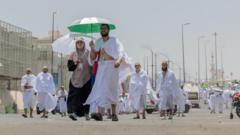**As Hajj festivities commence, Saudi officials have introduced comprehensive safety protocols to protect pilgrims from intense heat, reflecting on past tragedies.**
**Saudi Arabia Implements Heat Safety Measures for Hajj Pilgrimage**

**Saudi Arabia Implements Heat Safety Measures for Hajj Pilgrimage**
**Authorities take action to safeguard over 1.4 million pilgrims against extreme temperatures in Mecca.**
Saudi authorities have put in place rigorous safety measures as they prepare for more than 1.4 million Muslims undertaking this year's Hajj pilgrimage in Mecca, amid concerns over extreme heat risks that previously resulted in over 1,300 fatalities. To combat the anticipated high temperatures of 44°C (111°F), officials have expanded shaded areas, planted thousands of trees, and introduced over 400 cooling units in public spaces.
In a crackdown aimed at ensuring only registered pilgrims participate, authorities have imposed fines of up to $5,000 for those entering without permits. This measure is in response to last year’s incidents where a majority of deceased pilgrims were unregistered and left vulnerable without essential amenities.
Many individuals opt for tourist visas rather than official Hajj packages, which can range between $4,000 and $20,000, restricting their access to critical services. The Saudi Press Agency confirms measures like enhanced cooling systems in the Grand Mosque—reported to be the largest in the world—and the development of rubberized roads specifically designed to alleviate heat-related issues.
On the inaugural day of the pilgrimage, male pilgrims donned traditional white garments and women covered themselves modestly as they commenced rituals in the Grand Mosque, including the tawaf around the Kaaba and the sai between Safa and Marwa. They will spend the night in Mina before proceeding to Mount Arafat for prayer.
Health officials are urging pilgrims to adhere to guidelines focused on heat safety, such as staying out of direct sunlight during peak hours and remaining hydrated. For the first time, artificial intelligence will also be deployed to monitor drone fleets that will aid in crowd management, further ensuring a safer experience for all pilgrims.
Reflecting on the tragic events of past Hajj seasons, including the 2015 stampede that claimed over 2,300 lives, Saudi Arabia's emphasis this year is on preventing similar tragedies, underscoring the importance of careful planning and management in one of Islam's most significant annual events.
In a crackdown aimed at ensuring only registered pilgrims participate, authorities have imposed fines of up to $5,000 for those entering without permits. This measure is in response to last year’s incidents where a majority of deceased pilgrims were unregistered and left vulnerable without essential amenities.
Many individuals opt for tourist visas rather than official Hajj packages, which can range between $4,000 and $20,000, restricting their access to critical services. The Saudi Press Agency confirms measures like enhanced cooling systems in the Grand Mosque—reported to be the largest in the world—and the development of rubberized roads specifically designed to alleviate heat-related issues.
On the inaugural day of the pilgrimage, male pilgrims donned traditional white garments and women covered themselves modestly as they commenced rituals in the Grand Mosque, including the tawaf around the Kaaba and the sai between Safa and Marwa. They will spend the night in Mina before proceeding to Mount Arafat for prayer.
Health officials are urging pilgrims to adhere to guidelines focused on heat safety, such as staying out of direct sunlight during peak hours and remaining hydrated. For the first time, artificial intelligence will also be deployed to monitor drone fleets that will aid in crowd management, further ensuring a safer experience for all pilgrims.
Reflecting on the tragic events of past Hajj seasons, including the 2015 stampede that claimed over 2,300 lives, Saudi Arabia's emphasis this year is on preventing similar tragedies, underscoring the importance of careful planning and management in one of Islam's most significant annual events.




















